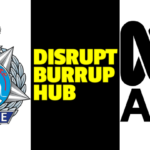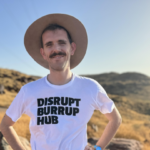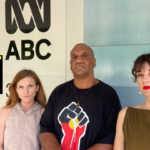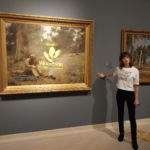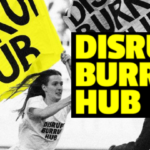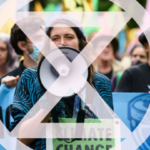Disrupt Burrup Hub Advisor Criticised for Media Prowess: Interview with Jesse Noakes
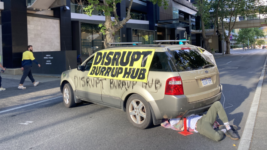
Disrupt Burrup Hub arrived on the scene in January last year, capturing the nation’s attention as artist and activist Joana Partyka spray painted the Woodside logo onto the classic Australian painting “Down on His Luck”, in a move that didn’t damage the artwork but drew attention to Burrup Hub.
Australian oil and gas corporation Woodside is currently extending the Burrup Hub project in northern WA, which is the largest proposed fossil fuel operation in Australia. The plan for the gas hub involves the extraction of six untapped fields and the drilling of 84 wells off the coast.
Not only will the 6 billion tonnes of CO2 that’s emitted into the atmosphere by 2070, help shatter the climate, but it will also destroy the nearby UNESCO-nominated Murujuga rock art site.
The ardent band of climate defenders that is DBH kept up their actions all year long to raise awareness around the impact Burrup Hub will have. And so effective were they that Woodside’s CEO took out a restraining order against three of them, while the ABC filmed a documentary about them.
Yet, prior to the doco Escalation airing, WA police began demanding the raw footage that journalists had taken of Disrupt Burrup Hub planning and attempting to carry out an action, and after it initially refused to divulge its sources, it caved and handed over all the footage in mid-November.
And just days later, and somewhat unsurprisingly, three DBH activists were arrested in relation to the footage.
Ruffling some feathers
Jesse Noakes is the media advisor for Disrupt Burrup Hub, and not only is he efficient with coordinating media in a manner that guarantees the climate message makes it to the nightly news, but he also brings his passion to the cause.
Indeed, Noakes is the go-to when someone has to chat with television presenters like Media Watch’s Paul Barry.
However, Noakes’ actions over the last 12 months seem to have irked some of WA’s journalists, especially The Australian’s Jenna Clarke, who wrote something of a hit piece in the national masthead about him on 18 December.
The problem Clarke raises in the writeup, the aspect of Noakes behaviour that she takes issue with, is that Jesse is a member of MEAA (the Media, Entertainment and Arts Alliance), yet the Murdoch reporter is unsure whether he can call himself a journalist, as she considers him an activist.
Clarke advises that for some reason she found it necessary to contact MEAA to quiz them about Noakes union membership, and then she goes on to outline that she’s not the only WA journo to have a gripe with the media advisor and she goes on to quote the opinion of others.
Sydney Criminal Lawyers spoke to Disrupt Burrup Hub media advisor Jesse Noakes about why journalists in WA are getting rankled about his union membership, the fact that journos don’t seem to be reporting on the issues he’s drawing attention to and how WA remains the wild west.
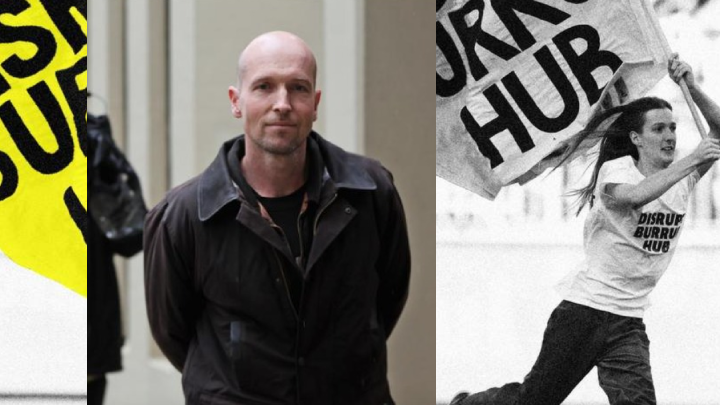
In an 18 December hit piece in The Australian Media Diary, journalist Jenna Clarke scrutinises your Media Entertainment and Arts Alliance membership, as she considers calling you a journalist is a “stretch”, as you don’t publish often, and you are rather “a prominent and effective activist”.
Jesse, you’ve featured heavily in the press recently in relation to your work as the media advisor for climate defence group Disrupt Burrup Hub.
So, why do you consider the Murdoch press has taken a moment to contemplate your union membership?
The key contention here seems to centre on my membership of the Media, Entertainment and Arts Alliance, not the “Journos Only Club”, which sounds like the most boring place in the world.
I describe myself as a writer, broadcaster and campaigner, with the emphasis on campaigning.
I’ve never called myself a journalist. I’ve never called myself an activist either. So, I can’t fault Jenna for that.
However, I still do some journalism. I’ve reported breaking news and features on youth justice, deaths in custody, environmental issues and political stories that have nothing to do with any advocacy or activism I’m also engaged with.
And while I wear a number of other hats as well, they’re all media roles.
Somewhat bizarrely Clarke then apparently talks to a couple of journalists from WA who are evidently really ticked off by your MEAA membership.
One of reporter remarks that the things you do cancel “out any claim you have to being a journalist”.
Clarke then goes on to suggest that WA-based journalist Kate Ferguson has been spurred by your questionable membership to apply for one of the MEAA vice president roles, and then she seems to make a slight about MEAA supporting an anti-Israel petition.
As you say, the reporters take on MEAA membership seems to be limited. What are your thoughts on these assertions?
I would say I qualify for MEAA membership under all three headings. I’m proud of the work I do across a range of portfolios to get very important stories out about highly sensitive issues affecting the most vulnerable communities in the country.
All the work I do is media, and I never stop working.
And overall, how would you say you took the piece?
On the whole, I thought the piece was pretty funny. Firstly, call me anything you like, as long as you call me effective.
I quite like Jenna. She’s from Manjimup. She was at the West Australian for years, so she knows that I’ve put dozens of homelessness stories on the front page of that paper over the past few years, with the result that we got the biggest public housing investment in WA history.
So, she knows what I do, and she knows how it works.
On the other hand, I also think her story is an example of some of the worst backgrounding I’ve ever seen by someone who’s keen to be the vice president of the media union next year, which is a little bit unseemly to someone like me who spends their whole life backgrounding.
Basically, one of the anonymous sources Jenna spoke to described their concern that my work is “dangerous” as it bridges the “enormous chasm between activism and journalism” which “cancels out” any claim I have to being a journalist – again, I never claimed it.
The next paragraph announced MEAA WA president Kate Ferguson’s candidacy for national vice president to address concerns such as these.
Three weeks ago, before this article appeared, the same evening that I appeared again on Media Watch regarding the Four Corners footage saga, Ms Ferguson used nearly identical words in a tweet calling for an important conversation about the “very large chasm that has to exist between activism and journalism”, where one instantly “cancels out” the other.
Given the subject of the column and the fact that Ms Ferguson is named in the following paragraph, it is implausible that the anonymous quote and the tweet were authored by different people.
Obviously, there’s a few journalists concerned with this blurring of activism and journalism. Is this something that concerns you?
I agree with Kate about the importance of discussing the role of journalism and activism in a world consumed by crises.
But I have to question the propriety of a MEAA state president anonymously backgrounding a national newspaper against a MEAA member, rather than attempting to address any concerns directly with me.
Indeed, when I responded to Ms Ferguson’s original tweet, which stated the “need to start an important conversation”, she replied that she didn’t want “to get bogged down in unnecessary drama” and that I was “not the main character here”, despite having just directly named me in an unprompted column that focused on me and my work.
I do think it’s a vital conversation, which is obviously brought into especially sharp focus by the conflict in Gaza where such a vast number of journalists have been murdered by Israeli strikes, often seeming to be specifically targeted for their work.
It’s hard for me to understand how anyone could continue to believe in objectivity, much less see it as a primary concern or consideration, when family and colleagues are being obliterated in front of their eyes and the only way we will know about it is if they take their camera out on the streets again the morning after.
And what applies immediately in Gaza also applies at a distance for those of us watching on – or not watching on.
A lot of the criticism of activist journalism stems from a discomfort with having the unquestioned assumptions and parameters of the liberal democratic consensus challenged by external shocks so overt and extreme that they reveal the whole Potemkin village for what it is.
Objectivity is usually just some variant of Western Enlightenment coloniser subjectivity, and now we see the consequences of that broadcast live.
I feel almost entirely unqualified to comment on specifics in Gaza, much less how it ought to best be covered by people who are at imminent risk of terrifying death.
But I did write a story recently for Crikey with a Gazan man who now lives in Perth who lost his sister and her children to an Israeli airstrike in the first weeks of the war.
I pitched the story because I felt completely powerless watching the destruction of hospitals and when I met Ayman and heard his story, I thought supporting him to share it was one thing I could do.
I initially wrote it as a reported piece but then we decided to make it a first person piece that Ayman and I collaborated on which gave it more immediacy.
I also helped connect him with a few other media outlets and he gave an extremely powerful interview to RN Breakfast among others.
I’m not suggesting that I contributed to one iota of change here – Ayman’s voice is so powerful that it was all him – but I just mean it as an instructive example of the illusory line between journalism and activism.
I write a story for Crikey and it’s called journalism. I facilitate a radio interview for RN Breakfast and it’s called PR or activism – really, there’s no difference between the two.
It’s all about getting the story out as sensitively and effectively as possible to try to make a difference.
I obviously have strong views on what is happening in Gaza – it would be craven infantilism not to and to pretend I don’t want preserve and insulate a story in the same way that amber preserves and insulated some prehistoric insect – by killing it and keeping it trapped forever in some sepia fog that refracts more than it conveys.
We are all advocates – some of us are just more upfront about it in our actions if not our disclaimers.
What applies to the conflict in Gaza applies in a less immediately harrowing sense to conversations and coverage of the climate crisis, its causes and the forces that reinforce it.
Who gets to speak? What is the frame? What are the methods and the heuristics? And what is the ultimate objective?
Is it simply to narrate the end of the world from some detached quasi-omniscient Olympus, or is it to descend into the trenches and muck in on the frontlines and actually help shape the stories that are going to shelter or sway or save what we can from the floods and fires that are coming for us?
Because as things stand the ABC just want to sit back and pretend that another fire season starting in September is a distinct and unrelated phenomenon to global heat records being obliterated month after month, which is also distinct and unrelated from Woodside getting more approvals to expand their Burrup Hub into the most emissions intensive fossil fuel project in the Southern Hemisphere, which is apparently unrelated to WA media refusing for years to make any of these connections until we basically forced them to by turning up with Four Corners to a WA police state ambush.
That’s not objective reporting – that’s wilful blindness and moral bankruptcy and bloody poor journalism.
Obviously, I am simplifying for effect here, but the basic dynamic is that the news as it stands, and as people like Kate Ferguson apparently wish it to be taught, is singularly ill-equipped to deal with a state of rolling perma-crisis which has, in fact, always been here but which is now increasingly hard to obscure and paper over with a mosaic of “floods coverage” and “fire coverage” and “conflict reporting” and “diplomatic coverage” because no one is buying it any more.
It is ironic and striking to me that, for all its ongoing death spiral, Twitter has remained the most reliable and immediate source of information and insight into what’s happening in Gaza because it is less mediated and unfiltered, not more.
Obviously, everything has to be considered critically, and everyone on there has their own biases – but so do The Age and the ABC – let alone The Australian and The West. They just refuse to admit it.
Give me an honest apologist any day, as long as they’ll still publish photos and videos of missile strikes and apartments on fire and children in mortuaries at the top of my feed long after The Guardian has taken down their special banner headlines.
It’s horrific but it’s happening. I can sort through the politics myself, but someone’s got to let me know what’s happening first, and the mainstream media is failing on every front, while it occupies itself with branding whistleblowers as activists because they care about a story.
As you say, the column was “unprompted”, so why did it appear out of nowhere?
The main issue here is WA media feeling extremely uncomfortable with my method because it exposes them for failing to do their job.
In some ways, the main yarn I’ve been trying to get up for years is all about how WA is a pariah state that is letting down the side across pretty much every issue I care about.
Aboriginal homelessness, child removals, incarceration, health outcomes, youth detention: it’s all worse in WA.
I sometimes say, “We’re the Australia of Australia, Australia squared, and the wild west is still the leading edge of colonisation and all its impacts.”
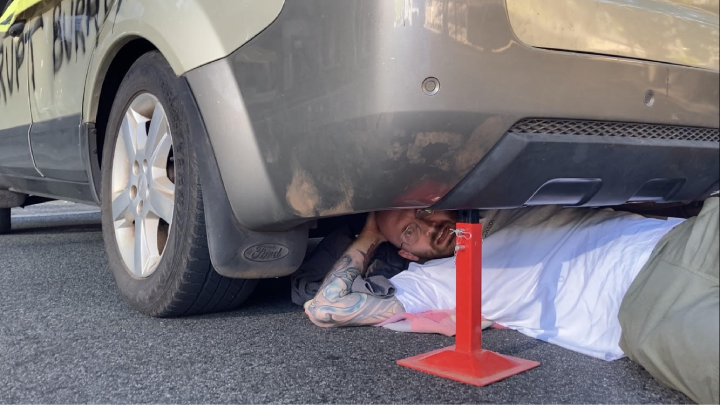
The ABC recently handed over footage to WA police that its journalists had taken of DBH members in August, as they were making a documentary regarding the climate defence group’s attempt to shut down Woodside’s Burrup Hub project.
I spoke to DBH’s Gerrad Mazza about the ABC deciding to breach the trust of your group in handing over the footage to police in December. What’s your assessment of the matter?
The one big break we had last year was getting Four Corners over here to do a story about the Burrup Hub and finally, start to peel back some of the layers of collusion, co-option and capture of the WA state by powerful vested interests in government, industry – and the media.
WA’s the only state where emissions are still going up. It’s the only state without a mandated reduction target for 2030.
And it’s the only state where the only newspaper is controlled by a company that makes most of its profits from mining and the gas industry and literally wants to pump its own gas through Woodside’s Burrup Hub so hard that they’re running a nonstop free advertising campaign for Woodside to tear down what remains of WA’s environmental and cultural heritage protections.
It’s the only state where one party currently controls all the levers of power and, despite ostensibly being a Labor party, it’s really just a big boost for big business, especially the biggest business in WA, resource extraction.
Almost none of those resources are reinvested in the communities they’re extracted from under.
Of course, health, housing, crime and suicide are all epidemic in the Pilbara, so often feted as the engine room of the national economy by WA politicians.
All of this is a profound tragedy, but it’s also a massive story. And the weirdest thing about WA is that so few people want to talk about it.
So, how would you describe the way that WA media does cover these issues?
SevenWest Media owns, in addition to its own interests, literally owns, $100 million of Woodside shares.
SevenWest don’t want to talk about it so much that they’ll throw whatever they can find against the few whistleblowers bold enough to speak out.
The ABC in WA don’t want to talk about it so much that they’ll just sideline, dismiss and marginalise alternate voices and filter their story selection through such a conservative filter that almost nothing worth preserving emerges.
That’s why it was such a breath of fresh air to get Four Corners over from the east coast to take a look, because as soon as they did, they were so shocked by the state of WA that they devoted their entire lineup to it.
Those ABC journalists then became front row participants in the game of police state politics that this whole thing has so readily dissolved into.
But the local media mavens don’t like it when the out-of-towners come in and start asking questions about why they have been asking so few questions about the status quo.
They don’t like that I help to lift the lid and get the word out and they don’t like that I’m good at what I do.
That’s why they were all lining up to “semi”-anonymously background Jenna – some better than others.
And that’s why they’re bothering to talk about me at all – because the Four Corners saga was the only interesting WA media story all year, and they’re jealous they don’t get to go on Media Watch too.
And lastly, Jesse, considering you’re copping all this flak from media colleagues who don’t appreciate your way of getting the message out, how would you describe the state of Australian media overall and more broadly, the ongoing push for fossil fuels?
John Pilger once said that “secretive power loathes journalists who do their job, who push back screens, peer behind façades, lift rocks.”
Pilger also inspired his own verb in the Oxford English Dictionary – “to pilger” was defined by Auberon Waugh as “when anybody who wants to make a good argument shouts and waves his arms about a lot and, oh, vaguely blames you for murdering Vietnamese babies’’.
Well, sorry, but in WA, babies are dying too – homeless on the street with their First Nations families, or in the raging bushfires of tomorrow caused by Woodside’s Burrup Hub today.
I’m not going to say the people heading up the companies and governments are responsible for those deaths, but they could stop them tomorrow.
Instead, WA keeps digging its own grave and everyone else’s by burning shit that should stay buried in the ground and piling the profits high in budget surpluses that never get seen by the people who really need them, and whose Country this really is.
I remain ready and willing to have this important conversation about the role of activism and journalism, and I will remain an active participant and instigator of difficult discussions about where we ought to draw the line and which voices we should listen to.
If that pisses off the complacent and comfortable denizens of the WA media industry, then so be it.
Pilger also said that “opprobrium from on high is the real journalist’s badge of honour”, and it also makes for somewhat entertaining drama.


